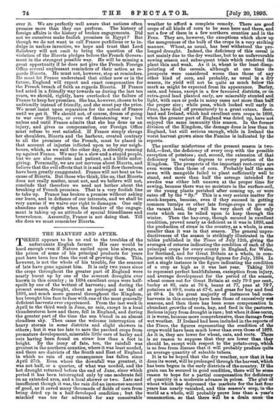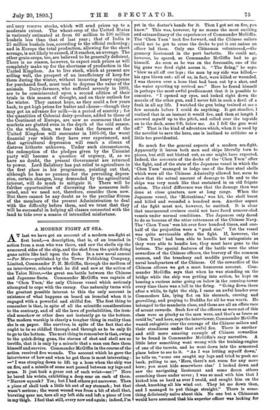THE HARVEST AND AFTER. T HERE appears to be no end
to the troubles of the unfortunate English farmer. His case would be hard enough even if Nature smiled upon him always, as the prices of some of his principal products for years past have been less than the cost of growing them. This, however, is not the whole of his trouble, for the seasons of late have gone against him. It is only two years since the crops throughout the greater part of England were nearly burnt up by one of the severest droughts ever known in this country ; in 1894 excellent crops were half- spoilt by one of the wettest of harvests; and during the present season, drought, about as prolonged as that of 1893, and much more general throughout the Kingdom, has brought him face to face with one of the most generally deficient harvests ever experienced. From the last week in April to the third week in June, no rain, except in a local thunderstorm here and there, fell in England, and during the greater part of the time the sun blazed in an almost cloudless sky. Then came the welcome interruption of heavy storms in some districts and slight showers in others; but it was too late to save the parched crops from premature development, miserable little ears of barley and oats having been found on straw less than a foot in height. By the irony of fate, too, the rainfall was greatest in the northern counties, where it was least needed, and there are districts of the South and East of England in which no rain of any consequence has fallen since April 27th. Even where the downfall was greatest, it was not half, or a quarter, of what was needed, and the hot drought returned before the end of June, since which period it has been interrupted only by one moderate fall on an extended area, and a local shower or two. Late and insufficient though it was, the rain did an immense amount of good, as it saved many thousands of fields of corn from being dried up in a half-developed condition ; but the mischief was too far advanced for any conceivable weather to afford a complete remedy. There are good crops of all kinds of corn to be seen here and there, and not a few of them in a few northern counties and in the Fens. They are, however, the exceptions which show up the meagreness of the bulk of the crops in a very striking manner. Wheat, as usual, has best withstood the pro- longed drought. Indeed, the deficiency of this cereal is not mainly due to the dry weather, but to an unfavourable sowing season and subsequent trials which rendered the plant thin and weak. As it is, wheat is the least disap- pointing of the cereals, although at one time its prospects were considered worse than those of any other kind of corn, and probably, as usual in a dry season, its yield will not be quite as much below the mark as might be expected from its appearance. Barley, oats, and beans, except in a few favoured districts, or on extra-good land planted early, are miserably stunted and light, with ears or pods in many cases not more than half the proper size ; while peas, which looked well early in June, have died off prematurely to a great extent. Scot- land and Ireland, which had excellent corn crops in 1893, when the greater part of England was dried up, have not enjoyed the same immunity this season. In the former division of the Kingdom, the damage done is less than in England, but still serious enough, while in Ireland the worst harvest grown since the Famine is indicated by the reports.
The peculiar misfortune of the present season is two- fold,—first, the deficiency of every crop with the possible exception of potatoes ; and, second, the extension of that deficiency in various degrees to every portion of the Kingdom. The prospects of the important root-crops are even worse than those of corn. Probably half the area sown with mangolds failed to plant sufficiently well to stand, and more than half the acreage intended for swedes was either left unsown at the proper time for sowing, because there was no moisture in the surface-soil, or the young plants perished after coming up, or were eaten off by the "fly." This is a very serious matter for stock-keepers, because, even if they succeed in getting common turnips or other late forage-crops to grow on the vacant land, they will be very short of the only roots which can be relied upon to keep through the winter. Then the hay-crop, though secured in excellent condition, proved nearly as deficient as it was in 1893, and the production of straw in the country, as a whole, is even smaller than it was in that season. The general unpro- ductiveness of the season is strikingly illustrated in the tables published in the Times of July 12th, giving the averages of returns indicating the condition of each of the principal crops for every county in England, for Wales, for Scotland, and for Great Britain as a whole, in com- parison with the corresponding figures for July, 1894. In not a single instance is the figure indicating the condition of a crop as high as it was last year. Taking 100 to represent perfect healthfulness, exemption from injury, and average development for the period of the season, wheat comes out for Great Britain at only 79.3 per cent., barley at 83, oats at 76.4, beans at 77, peas at 78.7, potatoes at 89.9, roots at 67.6, and grass for hay and feed. at 68-4. In the great majority of instances bad corn- harvests in this country have been those of excessively wet seasons, and then there has been some compensation in abundant growths of roots, hay, and feed in the pastures. Serious injury from drought is rare ; but when it does occur, it is worse, because more comprehensive, than damage-from wet weather. If Ireland had been included in the reports of the Times, the figures representing the condition of the crops would have been much lower than even those of 1893. As it is, they are lower for wheat, oats, and roots. There is no reason to suppose that they are lower than they should be, except with respect to the potato-crop, which is so free from disease that it will probably produce quite an average quantity of saleable tubers.
It is to be hoped that the dry weather, now that it has done its worst, will be prolonged through the harvest, Which has been begun in the early districts of the country. If the grain can be secured in good condition, there will be some reason to hope for a partial compensation for deficiency of quantity in a moderate advance in prices. The glut of wheat which has depressed the markets for the last four years has nearly vanished, and this season's crop, in-the world as a whole, will probably prove less than a year's consumption. so that there will be a drain IID011 the ord.nary reserve stocks, which will send prices up to a moderate extent. The wheat-crop of the United States is variously estimated at from 60 million to 100 million bushels less than that of last year ; that of India is 25 million bushels less, according to the official reckoning; and in Europe the total production, allowing for the short acreage, is not likely to exceed, if it reaches, an average. The other grain-crops, too, are believed to be generally deficient. There is no reason, however, to expect such prices as will completely make up for the shortness of production in the United Kingdom. As to live stock, which at present are selling well, the prospect of an insufficiency of keep for them during the winter, without incurring heavy expense for purchased food, must tend to depress the value of the animals. Dairy-farmers, who suffered severely in 1893, are to be commiserated upon a second edition of their trials in this season of drought, and on their outlook for the winter. They cannot hope, as they could a few years back, to get high prices for butter and cheese—though they may get an advance for milk—in a period of scarcity ; for the quantities of Colonial dairy-produce, added to those of the Continent of Europe, are now so enormous that the markets are glutted even in the depth of the cold season. On the whole, then, we fear that the farmers of the United Kingdom will encounter in 1895-96, the worst financial year which they have ever experienced, and that agricultural depression will reach a climax of distress hitherto unknown. Under such circumstances, the redemption of the pledges given by the Unionist party will become a question of urgency, if, as we have no doubt, the present Government are returned to power. Lord Salisbury has put relief to agriculture in the first place in his programme, pointing out that, although be has no panacea for the prevailing depres- sion, certain changes, long demanded by the agricultural interest, will do much to mitigate it. There will be further opportunities of discussing the measures indi- cated, and we need not, therefore, considei them now. But there cannot be any doubt as to the peculiar fitness of the members of the present Administration to deal with the difficulty before them, and we trust that they will be successful in helping all classes connected with the land to tide over a season of intensified misfortune.



































 Previous page
Previous page